
May 2, 2010
 CR Sunday Interview: Glen Brunswick
CR Sunday Interview: Glen Brunswick


*****

I don't get to interview creators that work
Glen Brunswick's general comics neighborhood, although I wish I did. Brunswick is that still relative rarity of an established screenwriter continuing to work his way into comics even after being exposed to some of the field's more frustrating aspects. An agent before he began to work in film, Brunswick hasn't been afraid to pick daunting projects. He was the writer with whom
John Romita Jr. worked on his first major independent project,
The Gray Area. He then worked with
Frank Espinosa on
Killing Girl, a project that had a different artist by series' end.
Brunswick's current project is
Jersey Gods, with the artist
Dan McDaid.
Jersey Gods is one of a handful of comics out there that use
Jack Kirby's work less as an inspiration than as an outright template -- a style, or even a musical key. Brunswick's approach is to turn the whole thing into a romantic comedy with occasional cosmic fistfights. The latest offering in
Jersey Gods is a second collected volume subtitled
And This Is Home. It is the second of what will be three total books for the series, which is apparently drawing to an end. -- Tom Spurgeon
*****
TOM SPURGEON: Since the focus of this interview is your Jersey Gods
series, I wanted to ask after any personal connection you might have with superhero comics and Jack Kirby comics specifically. Is that part of your comics DNA? Do you have the traditional comics-reading back story? Was it always easy for you to process what Jack Kirby did?
GLEN BRUNSWICK: Spider-Man was always my favorite comic as a boy -- the version drawn by
John Romita, Sr. I was a
Marvel junkie. I still haven't forgiven Romita Sr. for
killing off Gwen Stacy. Those issues, where she dies, were some of the very first comics I bought with my own allowance money. I was so stunned I was tempted to demand a refund from Marvel. That combination of hard luck infused with an everyman quality really had me fully empathizing with Spider-Man. It had a profound affect in they way I think about character as I try to create touchstones that I hope my own audience can relate to.
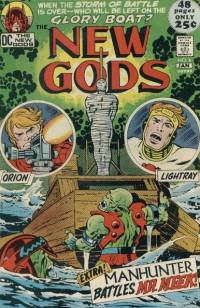
Kirby was harder for me to digest. Although I was a huge fan of all the Marvel concepts he had created, I had a hard time understanding the whole
Fourth World thing. My first Kirby purchase was
Mister Miracle #11. I bought a number of the back issues from
New Gods,
Mister Miracle and
Forever People, wanting dearly to love them, in the way that I felt about Kirby's Marvel work. They just never felt accessible to me. I was missing the
Stan Lee influence. As an adult, I went back to revisit Kirby's
New Gods. I was blown away with the sheer magnitude of his concepts firing on all cylinders. Even the dialogue, which had been somewhat off putting to me as a child, now drew me in. I view Jack's Fourth World work as an absolute peak for him creatively. And although it's unfortunate that he never got to finish that story at least we got to see his vision relatively pure and unfiltered -- just the way he wanted it.
SPURGEON: You found yourself in comics by your Ex Machina
script bringing John Romita's attention your way.
BRUNSWICK: I met John after I had co-written the story that became
Frequency --
Ex Machina was later.
SPURGEON: My bad. Now, had you ever thought about doing comics before then?
BRUNSWICK: I wanted to write comics, I just didn't know how to go about it. I would go to
Comic-Con to try to chat up some of the writers at the show. They were always impressed by the fact that I had written a film and couldn't understand why I wanted to waste my time writing comics. They tried to talk me out of it. The fact that I loved comics never seemed to move them much. I figured it must be some kind of secret society. I always want to be a member of the club that doesn't want me. Groucho Marx has been an excellent tutor in that regard.

SPURGEON:
Now that you've had a couple of years of creative perspective on The Gray Area
, is there anything you'd do differently if you were scripting that project now? My memory of that project is that it was skillfully executed but maybe a little thick on being a showcase project, perhaps a little self-conscious, although I wouldn't be surprised if you flat disagreed with me.
BRUNSWICK: The Gray Area was my first attempt in comics. I've learned a lot in the six years since I wrote that text. It's funny you should ask this question now because I've recently had to put plenty of thought into this. Marvel is going to reissue
Gray Area under
their Icon banner later this year. I've written an additional scene that John is drawing. I'm also doing a page one rewrite to the entire book. It's amazing to get a second opportunity to revisit the text with the skills I've managed to accumulate these past years.
In reading over the original version, I feel the basic plot holds up but the way in which I convey character info needs to be more organic. There is a lot of expositional info dump in the original that I thought I needed at the time and now feel differently. So I'm pulling out all the stuff that I really don't think works well and replacing it with stronger character moments. Hopefully the book will find a new audience when it comes out again. Those who enjoyed the book in the past will find many new surprises in store for them.
 SPURGEON: There was a rumor about
SPURGEON: There was a rumor about The Gray Area
back when it was coming out that some of the folks close to the book were shocked that it didn't seem to have a chance to break out; that it was one of the first books that was proof the market was becoming more rigid than we'd ever seen before. Was the fact that it didn't break out sales-wise a disappointment to you or John?
BRUNSWICK: I think the book had its fans and detractors. From a sales perspective, the comic book version did
very well. We sold 25,000 copies of the first issue at a price point of six dollars. This is when the average book was selling for three bucks. The graphic novel version did not do quite as well. I think we still have some books left in inventory. For those that would like to compare the two versions in future they are currently
still available through Amazon. In retrospect, I guess we were disappointed that the book didn't find real legs or develop more long term traction. As a first book, though, I'm still really proud of it. Working with JRjr was a dream come true!
SPURGEON: Does the kind of success available to the sorts of books you might do factor into your plans for doing them?
BRUNSWICK: The marketplace always dictates what kind of book you plan on doing. You still have to sell your idea to the publisher. The publisher is looking to do books that the marketplace will readily embrace. Very few artists, in any field, can sell product on the basis of their name recognition alone. At the same time you need to find areas of compromise between stories that move you and what the marketplace dictates. It's tough writing something that you don't believe in even if you think the market really wants that kind of book. You need to be moved within the confines of what you think may sell -- because selling is what you're are going to wind up doing through the many stages of creation, production and marketing of your project. It really never ends. Even if you're only pitching the idea to an acquaintance at a dinner party -- you're still selling your initial idea -- so you better love it -- at least a little bit.

SPURGEON:
Killing Girl
was an interesting project with an even more compelling publishing history than Gray Area, as it turned out. This isn't the day to get into what happened on that project -- unless you're dying to, in which case go for it -- but did you learn from that experience? Does coming from working in Hollywood where you're constantly fighting for control on projects and I would imagine eventually almost in every case letting go at a certain point better prepare you for those occasions in comics when you're not able to shepherd through a comics project?
BRUNSWICK: The thing that I learned is if you get a distinctive artist to work with you, as I did on
Killing Girl, you need to make sure that they are going to finish the story arc they started. It's really tough to find another artist to match a unique talent's work. I guess the other option would be to work with more generic artists -- they're more replaceable. But the trade off is the art becomes less exciting. That's a huge cost for me. The real excitement of making comics is when your artist first turns in those pages and you begin to see your story breathe and take flight. Those are the moments that really get my heart racing. It's why I do what I do.
I haven't worked on any projects that weren't creator owned. I haven't really had to deal with loosing control of any of my comic projects yet. But the Hollywood mindset has certainly put me in a position to deal with that situation should it come up in the future. I think that if you have the ability to bend to the marketplace then it isn't much more of a stretch to bend to the dictates of an editor or a producer or a director. It they're smarter than you that can help make the transition easier as well. Someone with bad ideas, that has control of your work, is not something I can wholeheartedly recommend.
SPURGEON: You've worked with a number of really powerful artists, artists adept at bringing to bear a specific style. At the same time, your work is also clearly high-concept focused, very much stuff that you could communicate in a verbal pitch, even if that's not your intent. How much, then, is your work influenced by the artist with whom you work, and how much of it is portable, do you think? For instance, in developing Jersey Gods
, how much did Dan McDaid's ability specifically have an effect on the way the project was brought to life?
BRUNSWICK: It's absolutely portable! The high-concept nature of my work, and I agree with your assessment of it, allows for a number of equally relevant interpretations that the artist can bring to it. I think that's just my Hollywood training that forces me to encapsulate my ideas into these smaller marketable boxes. It saves a lot of time when pitching the project to an artist, publisher, retailer and eventually the public. I'm constantly looking for something that's engaging and easy to understand or convey. That's a huge part of the challenge. I'm open, however, to the idea that this may change as I continue to grow.
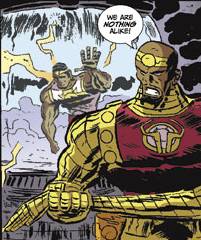
That being said,
Jersey Gods would not be
Jersey Gods without Dan McDaid. Dan is an artist with an utterly unique style who places story ahead of his pictures. Not that his pictures aren't lovely -- they most certainly are! But he thinks about what will best serve the project. He thinks about the pieces of business that I may have left out of the script but probably shouldn't have. He considers the tone, adding visual humor or pathos -- whatever the scene requires. I rely on Dan completely. He offers me an additional set of invested eyes as we edit each and every book together upon its completion. Dan is my creative partner in
Jersey Gods. I hope to do many more projects with him in the future. It's the kind of partnership, and friendship, you always hope to find when you set out to find a collaborator. He's irreplaceable! And I really hope that he never
ever reads this -- we don't want to feed the man's already-expanding ego.
SPURGEON: Don't worry: no one reads this site. Hey, here's the one question I've been dying to ask you. When people write that they enjoy Jersey Gods
, they usually cite the very Kirby mix of the Galactic with the Ordinary. My question to you is this: why do people find that mix enjoyable? Is it that having both elements makes for a more satisfying overall experience? Does the ordinary comment on the extraordinary and vice-versa? Is it just two things that blend together well, peanut butter cup style?
BRUNSWICK: I think people want to see something new and fantastic, but they want to process it in a way that's familiar to them. If a god-like culture is too alien it makes it hard to relate -- to take the journey. When the fantastic is mixed up with inter personal relationships that we all can recognize it helps make the material palatable. We all build God in our own image, don't we? If the Gods have human failings, perhaps... there's hope for us all.
 SPURGEON: My focus for this interview was the second volume, And This Is Home. Second volumes of mainstream serial comics fascinate me, especially in today's brutal market where there's usually some sort of sales reality pressing in on a series. Did you have a firm idea of where you wanted to go if the series was successful enough for you to want to continue? How firm are your plans for the next set of five issues while working on this one? How do you balance that kind of planning and structure and ability to build things within a narrative to being open to what the story might suddenly suggest to you?
SPURGEON: My focus for this interview was the second volume, And This Is Home. Second volumes of mainstream serial comics fascinate me, especially in today's brutal market where there's usually some sort of sales reality pressing in on a series. Did you have a firm idea of where you wanted to go if the series was successful enough for you to want to continue? How firm are your plans for the next set of five issues while working on this one? How do you balance that kind of planning and structure and ability to build things within a narrative to being open to what the story might suddenly suggest to you?
BRUNSWICK: I did -- my initial outline had an overall story arc that took me through 12 issues.
Jersey Gods was always a bigger story. Given the realities of the marketplace, we've decided to end the current
Jersey Gods series next month with the 12th issue. The final book will be double-sized, and it's the organic endpoint and climax of the series that I always intended. If we had gone longer I would have had additional story arcs: The wedding of Barock and Zoe, the return of Barock's father from his 10,000 year-old grave and possibly a potential crossover with
Richard Starking's Image book Elephantmen. I had this fun idea with Barock's mom, who has the power to turn into an elephant-like creature, getting caught in a vortex that takes her to the
Elephantmen universe. She loses her memory and is trapped in that world until Barock and Zoe arrive to retrieve her. Richard was keen on the idea as well. Maybe it's something we'll consider one day in the future.
I try to have a structured outline of where I want to go in a series, but I always give my characters room to move in unexpected ways. This happened more than I anticipated in Volume 2 -- the whole journey to Barock's home world, to have Zoe meet his mother, came out of listening to my characters and taking them where I thought they wanted to go -- as opposed to taking them where my outline had dictated. I think it's important to have that kind of flexibility. I like to leave myself open to capturing gems that may add to the story.
We will have a final third trade,
Thunder Road, that will include the 70 pages that make up the final story from issues 11 and 12. It will also include Mark Waid's back-up story and the promotional story that was in the back of
Invincible #55. I hope we can return to
Jersey Gods one of these days. Obviously, if the trades do well or if the rights sell to film or TV it may open the door to us returning to the series. Dan and I are keeping are fingers crossed. You never know.
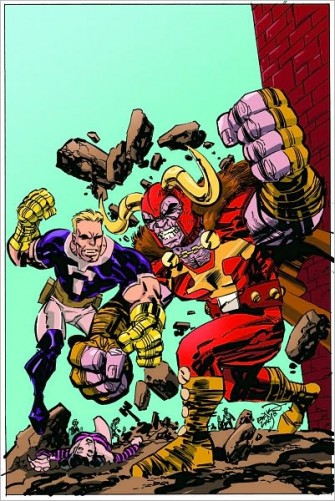 SPURGEON: It's funny in that I just read James Robinson's introduction to the second book, and he mentioned that he would like to come back and do the introduction when you get past issue 105. This would be the 21st or 22nd book, so you're stopping 18 short. Is it possible to have a series run that long these day? Is this series' stoppage particularly disappointing to you?
SPURGEON: It's funny in that I just read James Robinson's introduction to the second book, and he mentioned that he would like to come back and do the introduction when you get past issue 105. This would be the 21st or 22nd book, so you're stopping 18 short. Is it possible to have a series run that long these day? Is this series' stoppage particularly disappointing to you?
BRUNSWICK: God bless, James Robinson! It doesn't look like that will come to pass. The wonderful thing that happened with
Jersey Gods was the critical support we got from so many of the comic professionals I've admired over the years. Artists like
Mike Allred,
Darwyn Cooke,
Paul Pope,
Erik Larsen and
Whilce Portacio to name a few. In addition, writers like
Mark Waid and
Kurt Busiek have become good friends of mine through the work. So even though it doesn't look like we'll make it to issue 105, I'm really so very proud of the book we created -- it touched some of my heroes that have touched me with their own work over the years. You really can't ask for much more than that.
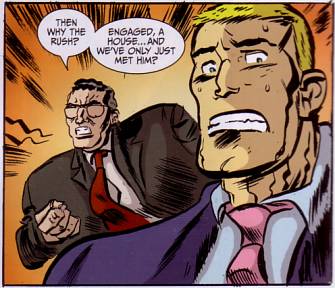 SPURGEON: One of the things I thought interesting about the second book is that your metaphor gets a workout in broader thematic areas. It seems to me there are parental issues throughout the book. Did you find this Kirby-esque set of tools useful in exploring those issues? Certainly there's a lot of humor to be mined from scale: the suburban dad trying to Alpha Dog this guy that can lift tanks, or the absurdity of how Barock's mother acts out her grief. What did you enjoy as a writer bringing those issues to bear in this volume?
SPURGEON: One of the things I thought interesting about the second book is that your metaphor gets a workout in broader thematic areas. It seems to me there are parental issues throughout the book. Did you find this Kirby-esque set of tools useful in exploring those issues? Certainly there's a lot of humor to be mined from scale: the suburban dad trying to Alpha Dog this guy that can lift tanks, or the absurdity of how Barock's mother acts out her grief. What did you enjoy as a writer bringing those issues to bear in this volume?
BRUNSWICK: It's just plain fun! Parental issues have a resonance that sticks with you your whole life. Your parent's screwed you up! They made you who you are today. They stick with you long after they die. There's no escape! The Kirbyesque tools were useful in creating the architecture of the
Jersey Gods universe, but the parental issues came straight out of my head -- from growing up inside a healthy broken Jewish East coast family household. Thank goodness I have an outlet!
SPURGEON: What's your Jersey background? Do you have one? The reason I ask is because your Jersey touchstones don't seem to be mobster or overtanned young people but more of Jersey as a place where mostly wealthy, mostly ordinary people live.
BRUNSWICK: I grew up in New York City. My father owned a lamp manufacturing company in
Newark, New Jersey where I spent some time as a boy. He also had a girlfriend that had a lingerie shop in
Millburn -- a Jersey suburb. I decided to use New Jersey as my setting due to the bad reputation that it suffers -- albeit undeserved. I thought I could mine some comedic moments by forcing Barock to reside there. I wanted to make New Jersey a part of the character of the book as well.
 SPURGEON: Do you have an interest in class issues? I think your original pitch involved the girl of privilege more than maybe the first book really dug into that aspect of Zoe's past, but it starts to come up again in the issue in volume two, up to and including a parable from Barock's homeworld about a society splitting according to their desires for consumption. Is that a fair reading? Do you want to explore that a bit more as you move forward? What do you ultimately want to say about that, given through this entertainment vehicle?
SPURGEON: Do you have an interest in class issues? I think your original pitch involved the girl of privilege more than maybe the first book really dug into that aspect of Zoe's past, but it starts to come up again in the issue in volume two, up to and including a parable from Barock's homeworld about a society splitting according to their desires for consumption. Is that a fair reading? Do you want to explore that a bit more as you move forward? What do you ultimately want to say about that, given through this entertainment vehicle?
BRUNSWICK: I really figured that the class issues in the book would be a major source of fun that I wanted to exploit between Barock and Zoe. The issues that I bring up, the pursuit of material things versus quality of life, is definitely something that I've thought about a lot in my own life. We all prioritize the things that we feel are important. The last thing I want to do is preach to anyone on the subject of what should be important in life. But I think that it's really difficult in our culture to get clear and decide what should really be our focus -- what will really make our lives fulfilling. Media surrounds us from the moment we get up telling us all the things that we need to be happy.
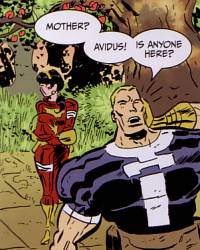
In my own life, I discovered that I really love the process of creating comic books. I'm sure there are much more lucrative things that I could do with my time. But the quality of my life when I'm involved in their creation is sublime. I liked the idea of creating this God world and society that said, "Enough," split in two, and dedicated one faction to the recovery of that world. Barock comes from that green faction while Zoe is from the other side of that equation with a material upbringing. The interesting thing is that each of them has something to give to the other in order to promote their mutual happiness. Finding the right balance is the difficult project of life and I guess by extension... my book.
SPURGEON: Let me re-ask a question I asked earlier. When you're exploring an issue like class, as opposed to parental issues, what is useful about the superhero comic in doing so?
BRUNSWICK: It's a great way to examine issues that we sometimes take way too seriously -- if we don't allow someone into a fancy restaurant because he's not wearing a tie that seems acceptable. When we don't let Spider-Man into a restaurant to stop a criminal, because he's not wearing a tie, a large part of the fun is watching this larger than life hero caught in society's web just like the rest of us. It allows us to reexamine our value system, from a different angle, in another engaging way.
 SPURGEON: Superhero stories have a lot of physical violence to them. Kirby certainly had an orientation towards violence that came from his own experiences in war and growing up in volatile urban neighborhoods. How conscious are you in terms of how the action and violence in your comics becomes presented? Do you feel it's important to grapple in some way with the overall effect of this kind of adventure material, or do you think that it's enough a part of the genre that readers are able to process it in terms of all the reading they've done?
SPURGEON: Superhero stories have a lot of physical violence to them. Kirby certainly had an orientation towards violence that came from his own experiences in war and growing up in volatile urban neighborhoods. How conscious are you in terms of how the action and violence in your comics becomes presented? Do you feel it's important to grapple in some way with the overall effect of this kind of adventure material, or do you think that it's enough a part of the genre that readers are able to process it in terms of all the reading they've done?
BRUNSWICK: I've never honestly put a lot of thought into it. To me violence is a part of our culture and our entertainment. It feels like a necessary ingredient to any adventure story. I guess the only place that I would draw the line is with violence for the sake of violence. But in the service of a good story, anything goes.
SPURGEON: What are your broader ambitions in comics, Glen? I think it's rare for someone with an active writing career elsewhere to invest as much as you have in multiple projects. Would Glen Brunswick the agent be totally on board with the choices made by Glen Brunswick the writer?
BRUNSWICK: I want to keep writing comics for as long as I have stories to tell in this medium. Nothing has given me the same creative satisfaction that I get from working on them. I do hope that I'll be able to at least exploit some of my comic ideas in other more lucrative arenas. Glen Brunswick the agent is definitely checking out the balance sheet. But in the end, it's no contest! I love comics, Tom. How many people can say they love what they do in life and truly mean it?
*****
*
Jersey Gods Volume Two: And This Is Home, Glen Brunswick and Dan McDaid, Image, softcover, 144 pages, April 2010, 9781607061175 (ISBN13), 1607061171 (ISBN10), $14.99.
*****
* cover art to
Jersey Gods Vol. 2
* photo provided by the writer
* Jack Kirby's
New Gods
* poster art from a cover to
Gray Area by John Romita, Jr.
*
Gray Area issue cover by John Romita, Jr.
*
Killing Girl cover by Frank Espinosa
* two fun single panels from
Jersey Gods Vol. 2 by Dan McDaid
* one of the many guest pieces of art in the
Jersey Gods run, from Erik Larsen
* Barock and his future father-in-law; McDaid
* the material seduction of Barock; McDaid
* some greenery; McDaid
* some violence; McDaid
* the black and white version of the second
Jersey Gods volume; McDaid
*****
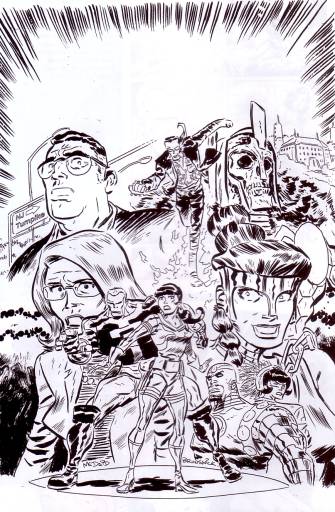
*****
*****
posted 8:30 am PST |
Permalink
Daily Blog Archives
November 2019
October 2019
September 2019
August 2019
July 2019
Full Archives


